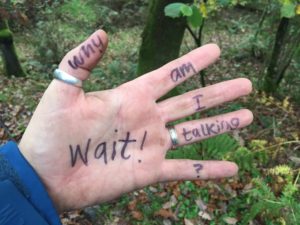I’m one of life’s enthusiasts. A cheerleader by nature. Recently however I’ve been trying to curb my natural instinct. Holding the idea in my mind that I always need to be thinking “who is doing the learning?” This reflective question has helped me notice what happens when I don’t ask a question, when I don’t intervene. *
We have become so encultured in education to ask questions, extend the learning, get involved. I come from a background in playwork where the child is put the driving seat of their development and I’ve noticed that the learning can be so much deeper if I curb my enthusiasm.
I’ve needed a prompt to slow down.
Why
Am
I
Talking
?
Taking 5 seconds between thinking of a good question and asking it is proving to be a challenge but one that is quite interesting. I’m noticing what people in flow states look like. I can see the body language of learning so much better, the way the physical movements fit together when ideas are working for someone. I’m also better at spotting frustration and when the need to move closer so I’m there as a resource if I’m needed.
Perry Else in his book The Value of Play explored some Play Centered Intervention styles
| Level 1- Play Maintenance
The Play is self contained, children are active in their play. No intervention is necessary, the adult observes the activity. |
| Level 2- Simple involvement
The adult acts as a resource for the play – this may be subtle as in making a tool available for use that a child might need or responding to a direct request from the children. |
| Level 3- Medial intervention
At the request of the child, the adult becomes involved in the play- such as offering alternatives from which the child chooses or by initiating a game then withdrawing. |
| Level 4 Complex intervention
The adult is interacting with more than one or a few children; there is need to interact differently and appropriately with them all as needed. The adult may need to observe, take on a role in the play, act as a partner to the playing child or when facing display give the child one to one support until the episode passes. |
There are times when judgment leads us to make non play based interventions, for example when a child is in imminent danger.
When adults feel compelled to intervene and umpire the situation this should be done with an awareness of why we are intervening and what is happening for the child.
Try it yourself sometime. When you are really involved in something, properly immersed and challenging yourself, notice the effect someone coming over and asking questions has on your concentration and engagement.
There is a time to ask good questions, but is this it?
Wait!
Why
Am
I
Talking
?
*Look how grubby my hands are! I’d just been hanging out with some 5-7 year olds, hunting down acorns to see how the mice had been nibbling them and admiring some massive slugs.











